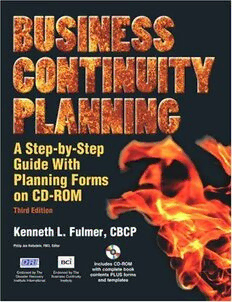
Business Continuity Planning: A Step By Step Guide PDF
02004·0.277 MB·English
Most books are stored in the elastic cloud where traffic is expensive. For this reason, we have a limit on daily download.
Preview Business Continuity Planning: A Step By Step Guide
Description:
Perfect Beginner's Guide in Workbook Format with Worksheets, Forms, Checklists, Tables and CD with Sample Plans and Templates This easy, how-to-do-it introduction to classical BCP comes in a workbook format with plentiful worksheets, forms, checklists and action items. It includes these features: * * * Endorsed by The Business Continuity Institute and Disaster Recovery Institute International * * * Worksheets in both the book and on CD in Microsoft Word providing step-by step practice in developing your own business continuity plan * * * Accompanying CD with wealth of templates and forms; bibliographies; articles and papers; links to a variety of related Web sites * * * Chapter overviews and objectives * * * Appendices with sample risk assessment and risk analysis checklist * * * Glossary with 120 business continuity terms * * * Ideal for senior undergraduate, MBA, certificate, and corporate training programs * * * Author is veteran practitioner of business continuity and disaster recovery for 20+ years If you are suddenly called upon to develop a business continuity plan (BCP) and have little or no experience in this new discipline, then this is the book for you! It takes you logically and methodically through the planning process from start to finish. It acknowledges the day-to-day realities of running an enterprise and guides you step-by-step through the generally accepted best practices in BCP, enabling you to construct an appropriate plan for your size of organization. It will neither overwhelm you nor break the bank, and it will get your business continuity program up and running surprisingly fast and with a lot less effort than you expect. It can also help you clearly explain to senior management the importance of developing a plan and the simplified steps needed to develop one. Even if your company decides not to develop a complete plan, you will find valuable steps you can take now that will reduce your disaster risk easily and without major funding. The author is a knowledgeable expert with 20 years of experience in business continuity planning. He uses straightforward, jargon-free writing and supplements it with checklists, tables and worksheets to illustrate the easiest path to your destination. There is an emphasis on the non-technical aspects of Information Technology/ Disaster Recovery planning, with the basic information easily transferable across the entire organization. The accompanying CD provides a wealth of handy templates and sample forms, including vulnerability worksheet; Business Impact Assessment (BIA) sample questionnaire for departments; cumulative outage costs worksheet; emergency response team assignments and call sheet; vendor call sheet; sample test plan and maintenance plan, etc. There are also checklists/ corrective action forms for various natural hazards, including, fires, floods, winter storms, hurricanes, earthquakes and tornadoes, along with an emergency response plan (ERP) checklist. Checklists for special hazards include those for power outages, boiler failures, bomb threats, hazardous material spills, and civil unrest, along with a checklist for vital records storage. The BCP resources include information about federal and state agencies, such as FEMA; bibliographies; articles and papers; and links to a variety of related Web sites. Once you have your basic plan in place, you can refer to this guide time and time again to build on your business continuity plan as your business evolves. The simplicity of this reference and accompanying materials on CD will allay your concerns and allow you to confidently devote more time and resources to this critical process.
See more
The list of books you might like
Most books are stored in the elastic cloud where traffic is expensive. For this reason, we have a limit on daily download.
